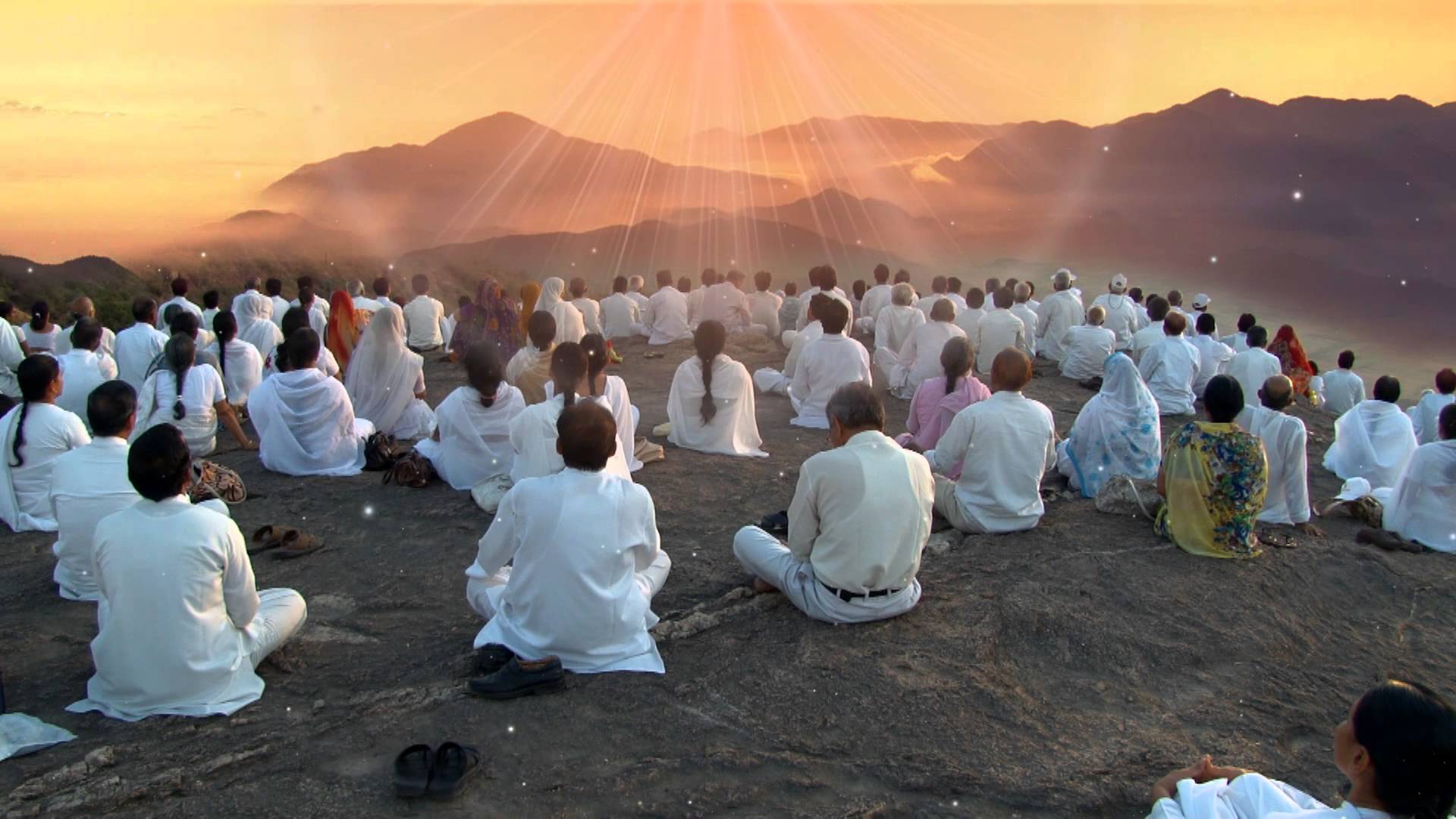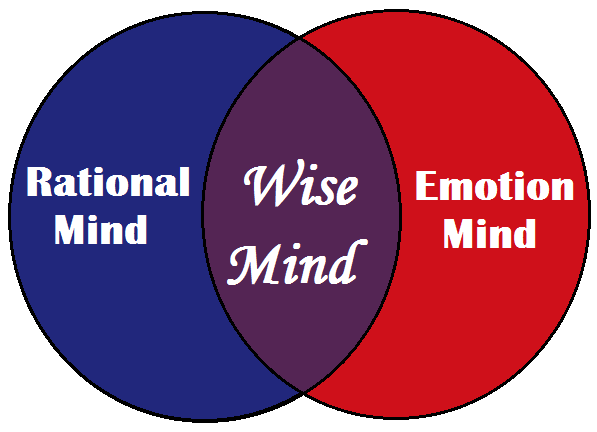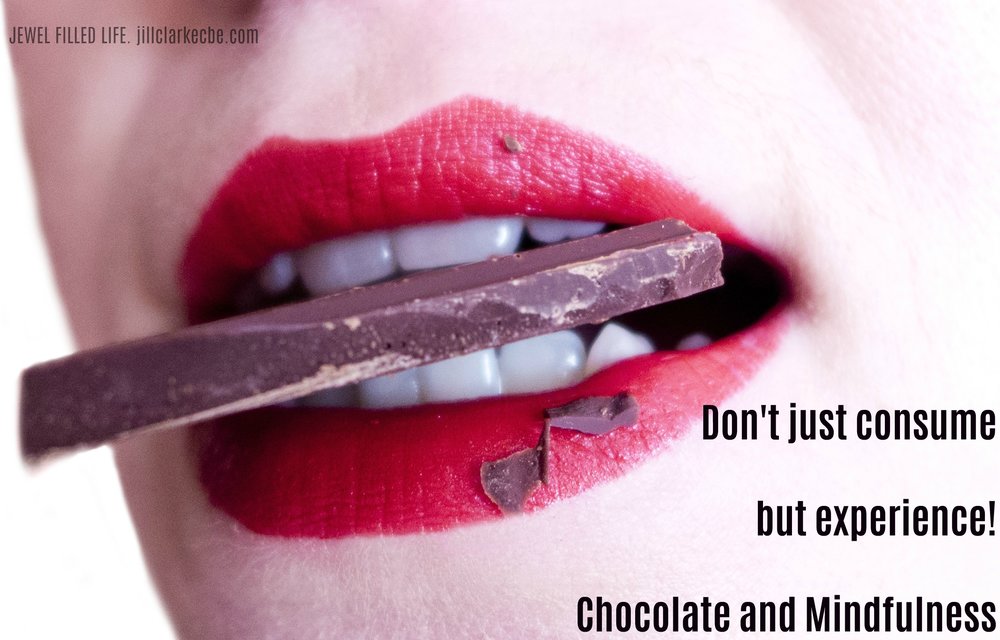mindfulness
Mindfulness books; mindfulness journals; and mindfulness workbooks
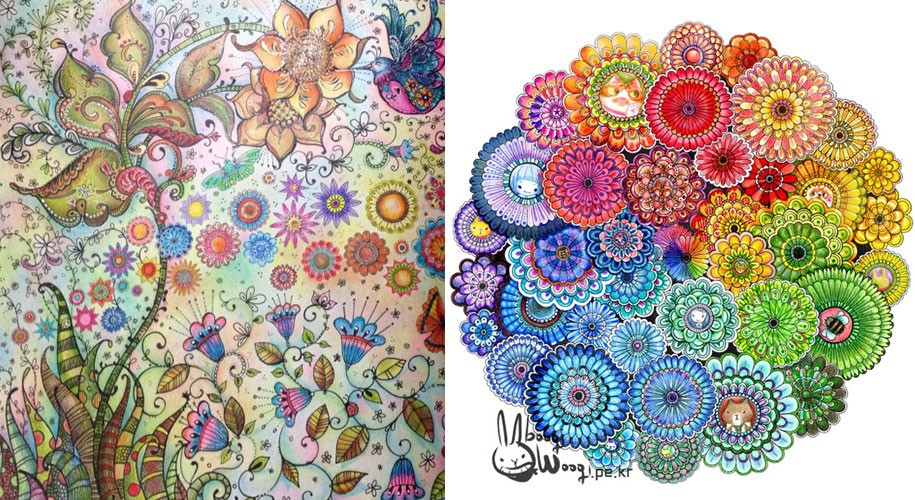
Mindfulness books; mindfulness journals; and mindfulness workbooks
by Janette Grant 30th May 2018
Today we’re going to look at a few of the many products available for mindfulness. There are plenty to choose from; there are hundreds of mindfulness books for example, including mindfulness colouring books, mindfulness journals and mindfulness workbooks. There are also numerous phone apps and we will take a look at some of the most popular ones.
 Mindfulness colouring books – a great way to de-stress is to indulge in some art therapy. Adult mindfulness colouring books are the latest weapon against stress and anxiety and it is clear from the booming sales of these books that as a nation we appear to have a great need for something to help calm us down! Adult mindfulness colouring books regularly feature in Amazon’s top 10 and last year in France, for example, the colouring-in book industry sold 3.5m books. There is a crossover with mindfulness and with mantras; activities in which the brain is engaged enough to stop it whirring, but not so much that the concentration is draining.
Mindfulness colouring books – a great way to de-stress is to indulge in some art therapy. Adult mindfulness colouring books are the latest weapon against stress and anxiety and it is clear from the booming sales of these books that as a nation we appear to have a great need for something to help calm us down! Adult mindfulness colouring books regularly feature in Amazon’s top 10 and last year in France, for example, the colouring-in book industry sold 3.5m books. There is a crossover with mindfulness and with mantras; activities in which the brain is engaged enough to stop it whirring, but not so much that the concentration is draining.
Those of us with very active minds can be made worse by anxiety, but spending time on a mindfulness colouring book can help to quieten down and slow down our minds and stop the thoughts swirling around. Although it is important to be aware not to stress about choosing the colours or making a mistake; an anxious person can easily find this happening!
Colouring-in is a wonderful therapy for those who are housebound, convalescing or immobile; it can help calm those with an anxiety disorder.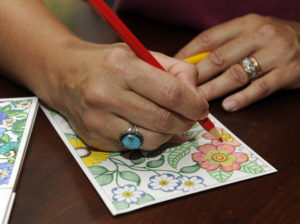
There are some amazing, beautiful books – Animorphia: An Extreme Colouring and Search Challenge for example, is full of hyper-detailed doodling and ideal for a young adult colouring-in experience. The unique and intricate ink drawings of Kerby Rosanes gives us a book where readers have to search for hidden treasures and creatures scattered throughout the pages. And if this type of colouring-in book appeals, there are many others in the series, such as Imagimorphia, Mythomorphia, Fantomorphia and Geomorphic (due out in October this year).
Some other popular Mindfulness colouring books are: The Mindfulness Colouring Book: Anti-stress art therapy for busy people, Millie Marotta’s Animal Kingdom: a colouring book adventure and Anti-Stress Colouring: doodle and dream

Close your eyes. Take a break. Inhale calmness. Exhale stress. Make a cuppa. Sink into a chair. Pick up a book. Disappear.
Mindfulness journals – these are all about encouraging mindfulness and giving ourselves room to breathe, think and play. If we find it difficult to commit to writing a full journal every day, we could start by setting a goal to spend a month writing down three things every day that happened over the 24 hours. After 30 days of this we will notice how it can make us feel lighter. Even when we don’t feel like we have much to write about, we can think about why? What was it about the day that felt below par? How can we change our behaviour to avoid that? We can evaluate whether there are certain people in our lives that appear in our journal more than others? We often have habitual routines, which can sometimes worsen or stress, so self-reflection can help us understand how we may be contributing to our own suffering or missing out on opportunities to experience joy.

Using a mindfulness journal can help us feel productive and to process what’s happening in our lives. It gives us the opportunity for a recap of our day. It is important to remember though, that whilst it’s easy to focus on all our happy moments, it is also important to reflect on all our feelings – negative as well as positive. It can help us to identify all our emotions, including sadness, embarrassment, shame and fear etc., as well as happiness, excitement, gratitude etc. Recognising the details of how we feel can help us understand why we act as we do.
The Mindfulness Journal: Exercises to help you find peace and calm wherever you are – this journal gives
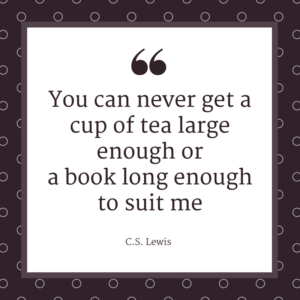
‘You can never get a cup of tea large enough or a book long enough to suit me’ C S Lewis
an introduction to mindfulness and easy exercises that can be done at our desk, whilst commuting, or whilst waiting in a queue at the supermarket. Beautifully illustrated, it will be our indispensable companion for finding physical and mental space for peace and calm in today’s busy, stressful world.

Mindfulness workbooks – these can help us get started with learning about the mindfulness practice. Practise makes perfect for all things and this applies to mindfulness too. We should read the workbook, learn the exercises and then take the time to practise them. It is a life-long exercise, but something we can improve on daily.
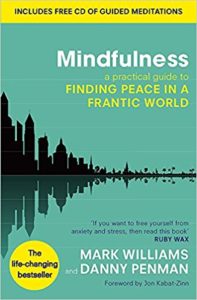 yet powerful, practises to be incorporated into our daily lives to help break the cycle of unhappiness, stress, anxiety and mental exhaustion and in turn, promote the kind of happiness that seeps into everything we do. It focuses on promoting joy and peace for those people who are struggling to keep up with the demands of the world around us, by boosting their happiness and confidence levels, whilst reducing anxiety, stress and irritability.
yet powerful, practises to be incorporated into our daily lives to help break the cycle of unhappiness, stress, anxiety and mental exhaustion and in turn, promote the kind of happiness that seeps into everything we do. It focuses on promoting joy and peace for those people who are struggling to keep up with the demands of the world around us, by boosting their happiness and confidence levels, whilst reducing anxiety, stress and irritability.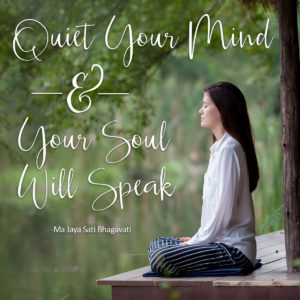
Quiet Your Mind & Your Soul Will Speak
Mindfulness Apps – these can be a great help in improving our wellbeing and aiding relaxation. They are not specifically designed to treat mental health issues and we should always seek professional help if we are suffering in this way, but these apps can be a complimentary extra.
There are many apps available and it’s important to look for those from a trusted information source with evidence of effectiveness. Choices will vary depending on whether we are new to mindfulness or a practised, long term pro; how much time we can give; and how we prefer to learn. Some apps can be used on the go, whilst others are better used when we are away from distractions and whilst some are free to use, others ask for a subscription.
Five of the top mindfulness apps are:
- Headspace – free download with optional upgrade for £9.99/month. This app teaches the basics of mindfulness and meditation through animations.
- Calm – free download with optional upgrade for £9.99/month. This app provides a number of voice-led meditation exercises and covers the basics, such as mindful breathing, in short, five minute sessions. There is also a library of calming music and ‘sleep stories’.
- Stop, Breathe and Think – free download with same price upgrade as above. The free version of this app offers about 30 meditation exercises and activities, including a body scan. It begins by asking us to ‘check in’ with ourself by noting how we are feeling – mentally and physically and then the app chooses the mindfulness exercise best suited to our mood.
- Aura – free download with optional upgrade for £7.99/month. A new app, focusing on short bursts of meditation, which fits easily into our busy lifestyles. There is the ‘daily reflection’ field, where we can record something for which we’re grateful, log our feelings and make notes alongside. This is all fed into a graph so we can track our mood from day to day. Sessions change daily – we can save those we particularly like – and are delivered by any of the 30 mindfulness teachers and therapists Aura works with.
- Smiling mind – free to download. Run by a not-for-profit organisation, this app is intended to make mindfulness ‘an accessible tool for all’. It has a pared-back, no-fuss design with programmes to suit specific age groups, with one aimed at parents wishing to help their children practise mindfulness. The range of programmes includes ‘The daily commute’ and ‘Mindful eating’, with meditations voiced over gentle music. A good app for the whole family.
So these are all just a selection of the thousands of books and apps available for mindfulness…isn’t it time we start exploring what mindfulness can do for us? Go on…take the first step….

mindfulness
50 Mindfulness quotes

50 Mindfulness quotes to inspire and uplift us!
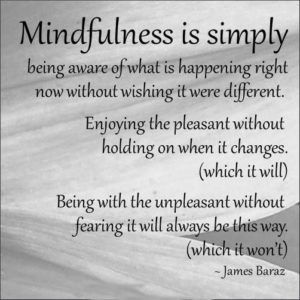
‘Mindfulness is simply being aware of what is happening right now without wishing it were different.
Enjoying the pleasant without holding on when it changes (which it will).
Being with the unpleasant without fearing it will always be this way (which it won’t). – James Baraz
by Janette Grant 16th June 2018
Sometimes all we need is a visual reminder to keep us focusing on the present moment, so I thought I’d bring us a page of mindfulness quotes to give us a little extra inspiration. A good quote can quickly sum up something meaningful in just a few words and may even help us to understand mindfulness better.
Here are some of my favourite quotes from many of the main mindfulness leaders, and others, about being mindful in general:

‘The little things? The little moments? They aren’t little’ Jon Kabat-Zinn

‘Mindfulness is a way of befriending ourselves and our experience’ Jon Kabat-Zinn
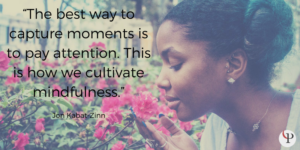
‘ The best way to capture moments is to pay attention. This is how we cultivate mindfulness’ Jon Kabat-Zinn

‘The moment one gives close attention to anything, even a blade of grass, it becomes a mysterious, awesome, indescribably magnificent world in itself.’ – Henry Miller

‘Don’t let life harden your heart’ – Pema Chödrön
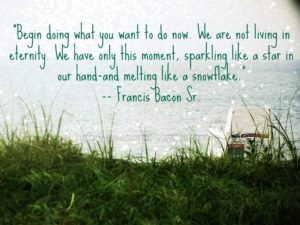
‘Begin doing what you want to do now. We are not living in eternity. We have only this moment, sparkling like a star in our hand – and melting like a snowflake.’ – Francis Bacon Sr.

‘Nothing is worth more than this day. You cannot relive yesterday. Tomorrow is still beyond your reach.’ – Johann Wolfgang von Goethe
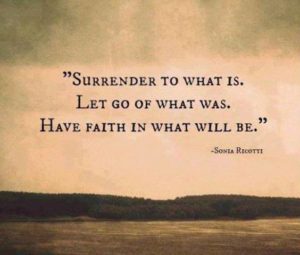
‘Surrender to what is. Let go of what was. Have faith in what will be’ – Sonia Recotti

Mindfulness means purposely paying attention, in the present moment, without making any kind of judgment’
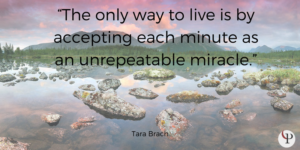
‘The only way to live is by accepting each minute as an unrepeatable miracle’ – by Tara Brach
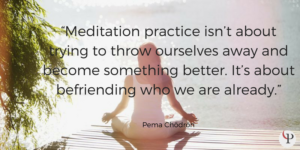
‘Meditation practice isn’t about trying to throw ourselves away and become something better. It’s about befriending who we are already.’ – Pema Chödrön
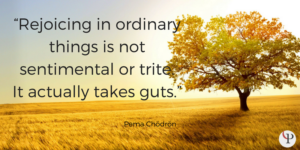
‘Rejoicing in ordinary things is not sentimental or trite. It actually takes guts.’ – by Pema Chödrön
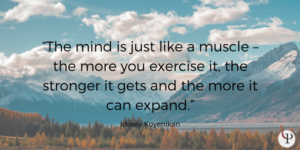
‘The mind is just like a muscle – the more you exercise it, the stronger it gets and the more it can expand.’
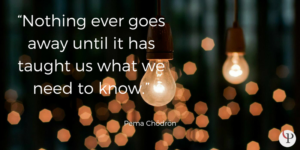
‘Nothing ever goes away until it has taught us what we need to know’ – Pema Chödrön

‘Treat everyone you meet as if they were you’
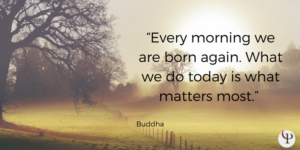
‘Every morning we are born again. What we do today is what matters most.’ – Buddha
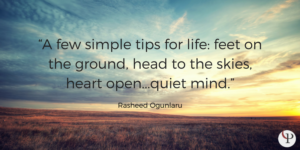
‘A few simple tips for life: feet on the ground, head to the skies, heart open, quiet mind’ – Rasheed Oguniaru
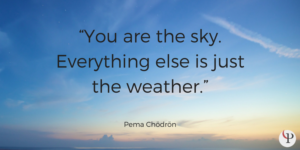
‘You are the sky, everything else is just the weather’ – Pema Chödrön
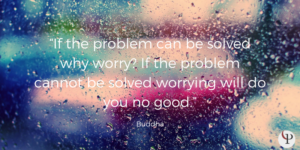
‘If the problem can be solved why worry? If the problem cannot be solved worrying will do you no good’ – Buddha
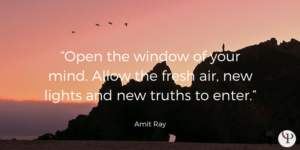
‘Open the window of your mind. Allow the fresh air, new lights and new truths to enter’ – Amit Ray
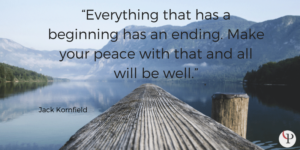
‘Everything that has a beginning has an ending. Make your peace with that and all will be well. – Jack Kornfield
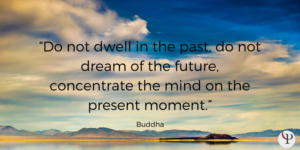
‘Do not dwell in the past, do not dream of the future, concentrate the mind on the present moment’ – Buddha
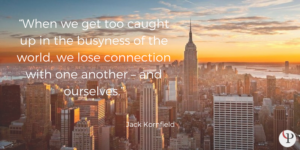
‘When we get too caught up in the busyness of the world, we lose connection with one another – and ourselves’ – Jack Kornfield
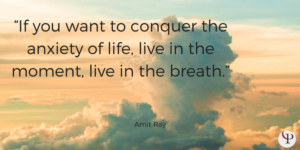
‘If you want to conquer the anxiety of life, live in the moment, live in the breath’ – Amit Ray
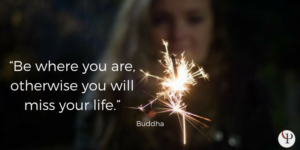
‘Be where you are, otherwise you will miss your life’ – Buddha
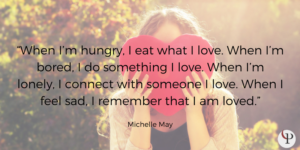
‘When I’m hungry, I eat what I love. When I’m bored, I do something I love. When I’m lonely, I connect with someone I love. When I feel sad, I remember that I am loved’ – Michelle May
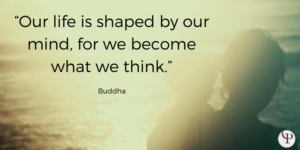
‘Our life is shaped by our mind, for we become what we think’ – Buddha
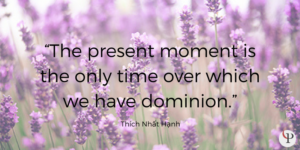
‘The present moment is the only time over which we have dominion’ – Thich Nhãt Hanh
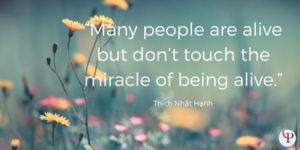
‘Many people are alive but don’t touch the miracle of being alive’ – Thich Nhãt Hanh
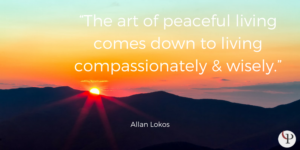
‘The art of peaceful living comes down to living compassionately and wisely.’ – Allan Lokos
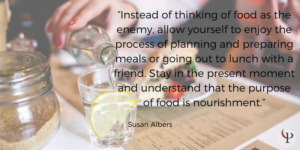
‘Instead of thinking of food as the enemy, allow yourself to enjoy the process of planning and preparing meals or going out to lunch with a friend. Stay in the present moment and understand that the purpose of food is nourishment.’ – Susan Albers
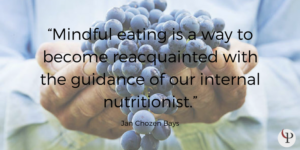
‘Mindful eating is a way to become reacquainted with the guidance of our internal nutritionist.’ – Jan Chozen Bays
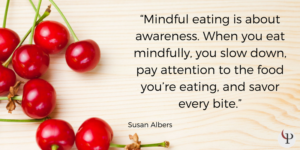
‘Mindful eating is about awareness. When you eat mindfully, you slow down, pay attention to the food you are eating, and savor every bite.’ – Susan Albers
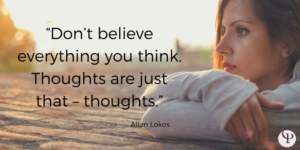
‘Don’t believe everything you think. Thoughts are just that – thoughts.’ – Allan Lokos
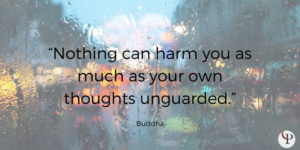
‘Nothing can harm you as much as your own thoughts unguarded.’ – Buddha
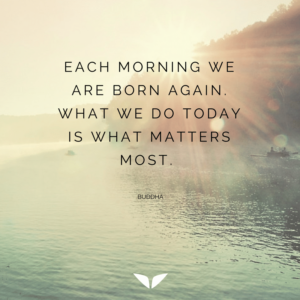
‘Each morning we are born again. What we do today is what matters most.’ – Buddha

‘You only lose what you cling to.’ – Buddha
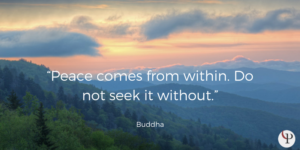
‘Peace comes from within. Do not seek it without.’ – Buddha
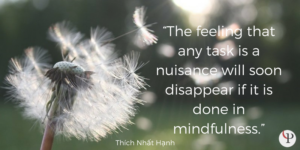
‘ The feeling that any task is a nuisance will soon disappear if it is done in mindfulness.’ – Thich Nhãt Hanh
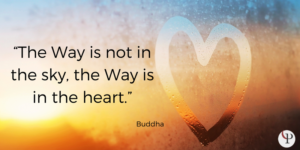
‘The Way is not in the sky, the Way is in the heart’ – Buddha

‘What you think you Become.’
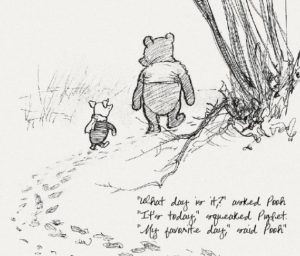
‘”What day is it?” asked Pooh. “It’s today.” squeaked Piglet. “My favourite day” said Pooh’
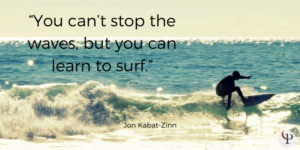
‘You can’t stop the waves, but you can learn to surf.’ – Jon Kabat-Zinn
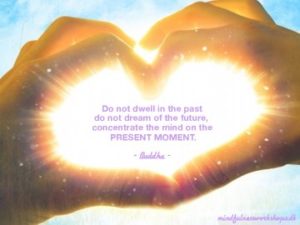
‘Do not dwell in the past, do not dream of the future, concentrate the mind on the present moment.’ – Buddha
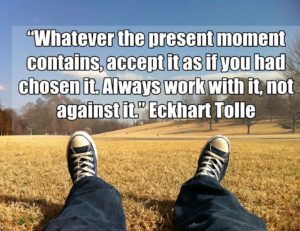
‘Whatever the present moment contains, accept it as if you had chosen it. Always work with it, not against it.’ – Eckhart Tolle
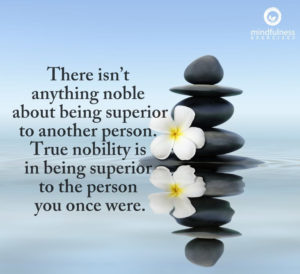
‘There isn’t anything noble about being superior to another person. True nobility is in being superior to the person you once were.’
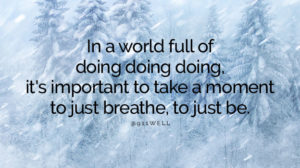
‘In a world full of doing doing doing, it’s important to take a moment to just breathe, to just be.’
I hope that the above quotes were inspiring to you, and especially hope that they have given you something new to reflect on for your mindfulness practice. I love to concentrate on a different quote every day and it definitely helps to have the image in my mind, along with the quote, to help me focus on the words.
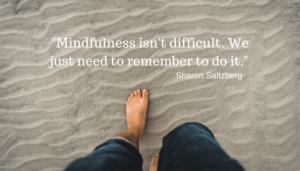
‘Mindfulness isn’t difficult…We just need to remember to do it.’ – Sharon Salzberg
If you’d like to continue exploring more inspirational quotes these will help you develop more mindfulness:
The Little Book of Wisdom: Change Your Outlook One Day at a Time – this is a collection of advice and teachings from the Dalai Lama, with his helpful insights on daily living, compassion and inner peace. Whatever our beliefs, his words have the power to calm and inspire us all.
Mindfulness Quotes: Thoughts for Meditation, Inner Peace and Change – short, powerful and easy to remember quotes, which make you think, meditate and help us live and feel our lives to their optimum. There are words of wisdom from Buddha, the Dalai Lama, Thich Nhãt Hanh and Jon Kabat-Zinn will show us how to live the present moment.
Mindfulness Affirmation Cards – create a clear, positive mindset with a pocketful of inspiration! These mindfulness cards feature beautiful images of nature and by helping us to focus on the present moment, we can calmly find peaceful resolutions to situations. They can help us monitor our thoughts and emotions, when we can progress to feeling more balanced, to bring calm and serenity to our lives.
exercises
11 Mindfulness Exercises

Mindfulness Exercises
by Janette Grant 16th June 2018

I talked about mindfulness meditation in my last post and it’s the big thing at the moment, but sometimes in this busy world of ours we just don’t have the time for a long, formal practice; our mind is constantly scattering our thoughts and emotions, leaving us feeling stressed, highly strung and often very anxious.
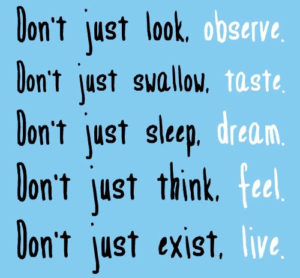
‘Don’t just look, observe.
Don’t just swallow, taste.
Don’t just sleep, dream.
Don’t just think, feel.
Don’t just exist, live.
It is unfortunate then, that most of us struggle to find five minutes to relax and meditate, let alone 30 minutes or more for a meditation session. Studies have shown how mindfulness meditation has many benefits, including reducing depression and pain, easing stress, accelerating cognition, increasing creativity and much more. So it is essential for our well-being to schedule a few minutes every day to cultivate mental spaciousness and achieve a positive mind-body balance.
Mindfulness exercises help us to become more aware of our more difficult and painful thoughts and feelings. The exercises can give us a sense of control over our thoughts, rather than feeling that we are controlled by them.
So…a quick and easy way to introduce some mindfulness meditation into our day is to do a few, simple mindfulness exercises, to empty our minds, to find some precious calm, and which can be slipped into our daily routine without having to always find time for some more formal mindfulness meditation.
11 examples of some easy mindfulness exercises are:
- Mindful walking – those of us who do regular walking every day – whether walking to work or
 walking the dog etc – can incorporate some walking mindfulness into the routine. Focus the attention on the sensation of our feet on the ground and our breath as we move. We can also move our attention to other parts of our body. The important thing is to have a relaxed attention.
walking the dog etc – can incorporate some walking mindfulness into the routine. Focus the attention on the sensation of our feet on the ground and our breath as we move. We can also move our attention to other parts of our body. The important thing is to have a relaxed attention. - Mindful eating – we all eat regularly of course and we can practise mindful eating whilst doing so. When we take the first bite, we should take a moment to pay attention to the taste – really savouring it. We can look at our food carefully, feel the textures, smell it and notice how our body reacts. We don’t need to do this all through the meal! We should just practise it occasionally.
- Mindful mini-break – instead of using our break between tasks to check our email/ Facebook etc we should practise a mindfulness exercise. We could sit for a moment to notice the sensations in our mind and body. Pay attention to how we feel and what we can hear. Try to be as present as possible and when our mind wanders (and it will), gently bring it back to the present and be in the moment.
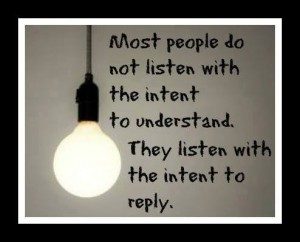
‘Most people do not listen with the intent to understand. They listen with the intent to reply’
- Mindful listening – we very quickly get used to a lot of sounds and learn to tune them out, so when we have the opportunity, we should try some mindful listening. Pay attention to what we can hear around us or put on some music and really listen to it for a while. Our mind may try to wander to things the music reminds us of, or try to think about the lyrics too much, but we should just let the music flow over us.
- Mindful brushing – some habits are mostly done in such a perfunctory way that we hardly notice them! But tonight, instead of allowing our mind to wander off whilst we brush our teeth, we could focus instead on actually experiencing it. Notice how the brush feels on our teeth and the taste of the toothpaste. We can include any chore, such as washing the dishes, or a routine shower, and incorporate mindfulness into the process – bringing our mind back to the present when it wanders off.
- Mindful breathing – we can choose any moment during our day to focus on one breath – perhaps in
 the few seconds before answering the phone or when standing in line somewhere. We can focus our attention on how it feels when we breathe in and breathe out, noticing on how the air expands our chest and abdomen. It’s just a simple, little reminder for our mind to be present.
the few seconds before answering the phone or when standing in line somewhere. We can focus our attention on how it feels when we breathe in and breathe out, noticing on how the air expands our chest and abdomen. It’s just a simple, little reminder for our mind to be present. - Mindful observation – this exercise can help us notice and appreciate our environment in a deeper way. It helps us to connect with the beauty around us, which is often overlooked when we are rushing around. We should choose an object, such as a flower, and focus on it for a minute or two, simply relaxing into watching it for as long as our concentration allow. Look at it as if it’s the first time it’s ever been seen and explore every aspect of it, connecting with its energy and purpose with the world.
- Mindful awareness – similar to mindful brushing, the aim here is to bring a more heightened awareness and appreciation to the everyday simple tasks we do and the results they achieve. Maybe something as simple as opening a door for example, where just as we touch the doorknob to open the door, we can stop for a moment and be mindful of where we are, how we feel in that moment and where the door leads. Or, maybe each time we smell food, we could take a moment to stop and be grateful to have good food to eat and share with our family. It doesn’t have to be a physical touch point cue though – it could be that each time we have a negative thought, we could take a moment to stop, label the thought as unhelpful and release the negativity. Just choose some touch points at some moments in the day to stop and cultivate awareness of what we are doing and the blessings those actions bring to our lives.

‘Today I will live in the moment’
- Mindful Immersion – the thinking behind this exercise is to build contentment in the moment, instead of our normal constant striving to finish one task just to get on with another! We need to take that regular chore and pay attention to every detail – experiencing it like we never have before. For example, when cleaning the house we should feel the motion when brushing up, sense the muscles we are using etc and discover new experiences within this familiar task. Instead of just working through and thinking about finishing the task, we should become aware of every step – fully immersing ourself into the process. We might even end up enjoying the cleaning for once!
- Mindful senses – a simple mindfulness exercise is to focus our awareness through our three senses

How to use your senses to be mindful
of sound, sight and touch on what we are experiencing right now. Taking a few breaths we should think: What are three things I can hear? What are three things I can see? What are three things I can feel? Think about these answers slowly, one sense at a time – it’s impossible to do this without being present and mindful.
- Mindful Appreciation – for this exercise we need to notice five things that we normally overlook – these can be people or objects or a mixture of both. The idea of this is to simply be thankful and appreciate the seemingly insignificant things in our life that support our existence, but that which we hardly give a second thought in our constant craving for bigger and better things. Even something as simple as the electricity that powers our kettle can be appreciated, but how often do we stop to think about how it exists or how it works? Have we recognised how it benefits our life and others? Have we thought about what life would be like without it and how everything is interconnected in this world of ours. I recently watched read a book where the first attack aliens used was to block all electricity in the world and it wasn’t until I truly sat and thought about how much we rely on it that I fully appreciated what it would mean to be without it! There is a saying: ‘If we woke up tomorrow ONLY with the things we were grateful for today, what would we have?’ Makes you think doesn’t it?! So…we should identify our five things and then endeavour to find out everything we can about their creation and purpose, so we can truly appreciate how they support our lives.
These items are great to help us expand our choice of simple little exercises we can use daily:
Mindfulness Pocketbook: Little Exercises for a Calmer Life – this little book has over 100 quick exercises for a wide range of situations in our lives, to help us become calm, collected and present. It will help us develop more mindful thinking, which will benefit us in our personal, social and work life.
The Little Book of Mindfulness: 10 minutes a day to less stress, more calm – these simple 5 and 10 minutes practises will help us rid ourselves of stress and find a more mindful, peaceful and relaxed life.
Stress Less Cards: 50 Inspirational Mindfulness & Meditation Cards – these cards contain 50 effective exercises to help us relieve stress and deal with anxiety whenever we need it. The techniques can be easily memorised and used anywhere to stop that stress reaction and help us relax.
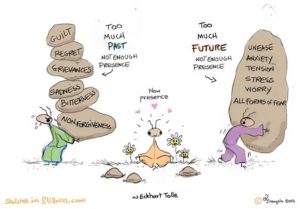 If we can regularly practise the above simple exercises every day for just a few minutes, we will develop a moment-by-moment awareness of our surroundings, which will help us better cope with all the negative thoughts and feelings that create stress and anxiety in our life. When we can control our ability to keep our mind in the present moment – instead of being led subconsciously by our emotions influenced by negative past experiences and fears of future occurrences – we can deal with all life’s challenges in a clear-minded, calm and assertive manner.
If we can regularly practise the above simple exercises every day for just a few minutes, we will develop a moment-by-moment awareness of our surroundings, which will help us better cope with all the negative thoughts and feelings that create stress and anxiety in our life. When we can control our ability to keep our mind in the present moment – instead of being led subconsciously by our emotions influenced by negative past experiences and fears of future occurrences – we can deal with all life’s challenges in a clear-minded, calm and assertive manner.
We will then expand into a fully conscious mind-set where we can escape from unhelpful, self-limiting thought patterns and become fully present to focus on positive emotions that will increase our compassion and understanding of ourselves and others.

meditation
100% Mindfulness meditation: what it does for us!
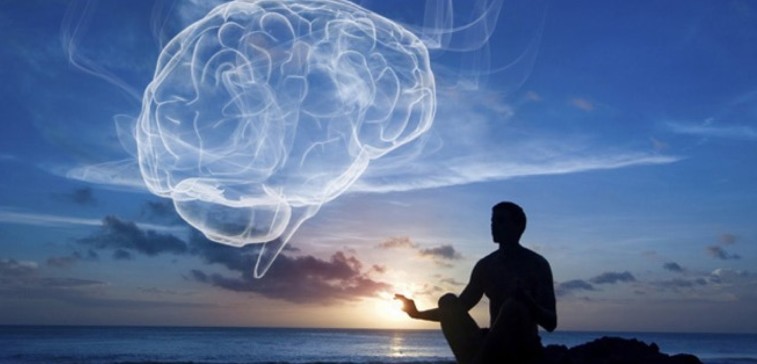
Mindfulness meditation and its health benefits
by Janette Grant 1st June 2018
What is mindfulness meditation? How often do we hear about meditation and mindfulness or even mindfulness benefits these days? The words are frequently  interchangeable and often, in a simplified way, refer to the similar idea – that of calming our frenzied minds. Mindfulness and meditation complement each other, like two sides of the same coin and they often overlap. But each also has its own specific definition and purpose and the main difference is that meditation is the large umbrella term for the practice of reaching ultimate consciousness and concentration, to acknowledge the mind and self-regulate it. It can involve many techniques to achieve this – one of which, is mindfulness. So mindfulness is a form of meditation, along with yoga, silence, breathing etc. There are many forms of meditation, but with mindfulness we bring our full mind to the present and focus completely on the moment. Being mindful of our breath, for example, is a common form of mindfulness during meditation and this improves our awareness of being in the present – this is called mindfulness meditation, or mindfulness buddism.
interchangeable and often, in a simplified way, refer to the similar idea – that of calming our frenzied minds. Mindfulness and meditation complement each other, like two sides of the same coin and they often overlap. But each also has its own specific definition and purpose and the main difference is that meditation is the large umbrella term for the practice of reaching ultimate consciousness and concentration, to acknowledge the mind and self-regulate it. It can involve many techniques to achieve this – one of which, is mindfulness. So mindfulness is a form of meditation, along with yoga, silence, breathing etc. There are many forms of meditation, but with mindfulness we bring our full mind to the present and focus completely on the moment. Being mindful of our breath, for example, is a common form of mindfulness during meditation and this improves our awareness of being in the present – this is called mindfulness meditation, or mindfulness buddism.
The practice of meditation predates mindfulness, which is often aligned with the Buddha when he discovered that focusing completely on his breath allowed him to see reality and reach meditation quicker. Whereas meditation is thought to have its origins in prehistoric religions.
What are the health benefits of combining both mindfulness and meditation?
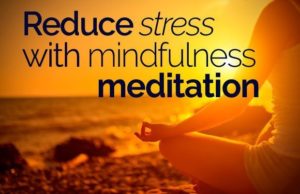
Reduce stress with mindfulness meditation
There is much evidence to suggest that harnessing our mind to be in the present can improve our mental and physical health. A recent study has found that practicing mindfulness can have a positive affect on glucose levels, showing that improved focus and self control can help fight obesity and unhealthy eating habits. Mindfulness meditation has also been linked to improved sleep quality amongst older adults who would normally end up using sleeping pills. It has been associated with improved focus, reduced dependency on opioid drugs and lowered anxiety and depression levels. And even more impressive is that research has recently shown that mindfulness exercises and positive thinking can have a beneficial effect on the DNA of breast cancer patients, which suggests that mindfulness meditation can have an even more extensive effect on our bodies than we even thought! 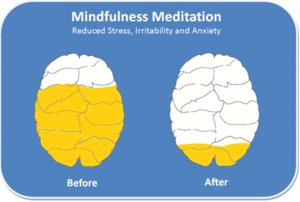
Mindfulness meditation helps us become aware of what is already true moment by moment, rather than attempting to make us different from how we are -mindfulness training additionally present with whatever is happening in our lives – no matter what that is. How does that help? Surely we want to suffer less and tune into the natural wisdom? Isn’t that making changes from how we are? Well yes…it is…suffering less and becoming more aware of our inherent wakefulness are changes from how we experience ourself most of the time, but…the only way to alleviate suffering and find our inherent wisdom is to dig more deeper into the present moment and into ourselves as we already are – not by trying to change what is happening.
Buddhists teaches how to practice mindfulness in helping escape from our direct experience; we try to get away from our pain and hang on to pleasure, but this just perpetuates our suffering. And we cause more suffering when we try to hang on to our ego.
Instead, when practising mindfulness meditation – paying precise, nonjudgmental attention to our experiences as they happen – we do not reject anything. In this way, we do not struggle to get away from difficult experiences – we merely practise being able to be with them. Equally importantly, we need to practise mindfulness during pleasant experiences as well; we often struggle to simply stay present with happiness and instead turn it into worrying that it won’t last or we try to keep it from disappearing.
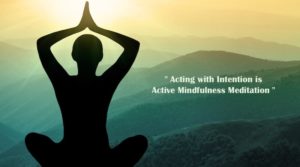
Acting with intention is Active Mindfulness Meditation
When we are mindful, we show up for our lives; we don’t miss them through distraction or in wishing things could be different. Instead, if something needs changing, being mindful means that we are present enough to understand what needs to be done. But being mindful should not prevent us from actually participating in our lives and taking care of our own and others’ needs; the more mindful we are, the more compassionate we will be.
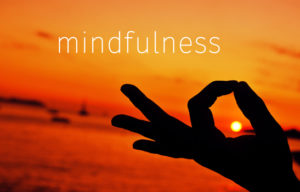 Remember – mindfulness meditation is all about being mindful of whatever happens. It is not about trying to stop ourselves thinking – this is not the aim. Many people think that meditation is about emptying our mind, but this is certainly not true for mindfulness meditation. So remember…when you are aware of thoughts running through your mind (and they will), just include them in what you notice…don’t try to get rid of them. It won’t work anyway, and it’s not what mindfulness meditation is about. We are just trying to be with ourselves as we are – not trying to change ourselves into some preconceived idea of what we think we should be.
Remember – mindfulness meditation is all about being mindful of whatever happens. It is not about trying to stop ourselves thinking – this is not the aim. Many people think that meditation is about emptying our mind, but this is certainly not true for mindfulness meditation. So remember…when you are aware of thoughts running through your mind (and they will), just include them in what you notice…don’t try to get rid of them. It won’t work anyway, and it’s not what mindfulness meditation is about. We are just trying to be with ourselves as we are – not trying to change ourselves into some preconceived idea of what we think we should be.
As we’ve already discussed, mindfulness meditation can have an enormously beneficial impact on our lives and so even as a beginner, if we just take ten minutes out of our day to be mindful – when drinking our tea, taking a break from work, or just focusing on our breath before sleep – there’s an amazing amount of power when we simply focus our mind.
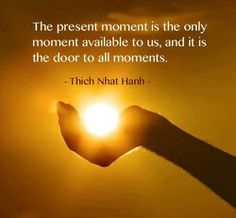
‘The present moment is the only moment available to us, and it is the door to all moments’ Thich Nhat Hanh
There are many books and audiobooks etc. available about Mindfulness meditation, but some of the most popular items are:
Wherever You Go, There You Are: Mindfulness Meditation for Everyday Life – this book is written by the father of modern day mindfulness – Jon Kabat-Zinn and he shows us how to cultivate mindfulness in our lives and awaken us to the possibilities of each present moment.
Guided Mindfulness Meditation (audio CD) – this audiobook is also read by Jon Kabat-Zinn and he explains how the power of mindfulness can bring change to our personal lives, and the world around us, from learning, growing and healing.
The Headspace Guide to Mindfulness & Meditation: 10 minutes can make the difference – this book is for beginners and expert meditators alike and it teaches skills to combat the negative aspects of our busy lives. These powerful techniques will help us to quiet the mind, feel less stressed and less tired and achieve calm and fulfilment.
Stress Less Cards – 50 Inspirational Mindfulness & Meditation Exercises – these cards contain 50 effective exercises to help us relieve stress and deal with anxiety whenever we need it. The techniques can be easily memorised and used anywhere to stop that stress reaction and help us relax.






